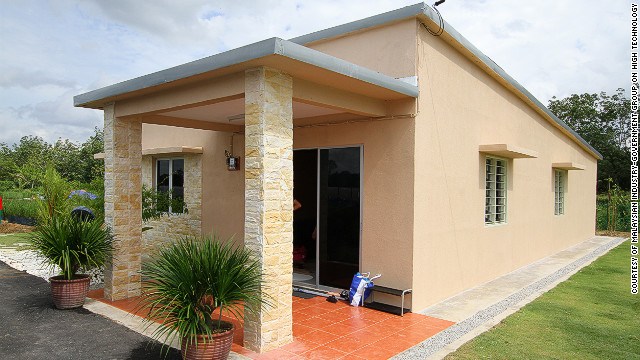'Smart village' ties modernity with sustainable living
July 27, 2012 -- Updated 0250 GMT (1050 HKT)
STORY HIGHLIGHTS
- U.S./Malaysian initiative aims to promote growth and sustainability in rural Malaysia with "smart villages"
- Incorporating energy efficient houses and "closed loop" agriculture could be model for other countries
- Aquaculture system provides food for residents anda also water for crops and trees on 12-hectare site
- Reliable food sources aimed at improving the wealth and health of people living on site
Built to the northeast of
capital Kuala Lumpur, Rimbunan Kaseh is the result of a public/private
partnership and could be used as a model for providing relief from
poverty around the world, according to its creators.
In addition to 100 homes,
residents have access to educational, training and recreational
facilities on site as well as a sustainable agricultural system which
provides a reliable food source and a supplementary income for
residents.
A four-level aquaculture
system plays host to guppies and algae which provide food for larger
fish like protein-rich tilapia. Filtered water from the fish tanks is
also used to irrigate trees, flowers and crops.
"It is a complete loop; a
modern farm -- one that could even exist on the rooftop of a building,"
Tan Say Jim, managing director of Malaysia's IRIS Corporation Berhad,
who are spearheading efforts, said in a statement.
With this project we stimulate rural growth with modern agriculture
activities, we balance development and economic activities between the
urban and rural areas ...
Tan Say Jim
Tan Say Jim
"With this project we
stimulate rural growth with modern agriculture activities, we balance
development and economic activities between the urban and rural areas,
we provide income and we improve living standards," Tan added.
All the homes on the 12-hectare site are energy efficient, sourcing power from solar panels complimented by biomass and hydro.
Further villages are
planned at as many as 12 locations in the country which will form a
network of "smart communities" laying the foundations for future jobs
and prosperity, developers predict.
Progress in poverty
reduction has been "uneven" in Malaysia, according to the United Nations
Development Program, with "pockets of hard-core rural poverty
remaining." But the situation is an improving one, with the national
poverty rates falling sharply over the last two decades.
Speaking at the
Institute for Diplomacy and Foreign Relations in Kuala Lumpur earlier
this year, U.N. Secretary-General Ban Ki-moon praised the country's
efforts to tackle poverty as part of the wider Millennium Development Goals.
"Your experiences can
help countries throughout the global South, and I urge Malaysia to look
at how it can increase South-South cooperation," Mr. Ban said.
"Malaysia is a
multi-ethnic, multi-religious and multi-cultural country. Promoting
unity among diversity, promoting one Malaysia among Malaysians is a
great vision, not only for the Malaysian people, but also for the region
..."
Ellis Rubenstein, president and chief executive of the New York Academy of Sciences and co-chair of Global Science and Innovation Advisory Council
(GSIAC) says the Malaysian model is a "great opportunity" to improve
the lives of poverty-stricken people in the country and around the
world.
"Integrated smart
communities could transform services available to Malaysia's citizenry
while creating thousands of jobs ..." Rubenstein said in a statement.
Set up in 2011, GSIAC is
a joint initiative between the New York Academy of Sciences and the
Malaysia Industry-Government for High Technology (MIGHT).
At a meeting earlier this month, Zakri Abdul Hamid, scientific adviser to the Prime Minister of Malaysia, praised the alliance.
"It opens the door to
major foreign investment. And it gives us the chance that no other
government -- either regional or national -- has anywhere in the world
to develop a staged, integrated solution to our citizens needs ..."
Zakri said.
-------------------------------------------------------------------

 There are 100 homes
on the site northeast of the capital Kuala Lumpur. Residents also have
access to educational, training and recreational facilities.
There are 100 homes
on the site northeast of the capital Kuala Lumpur. Residents also have
access to educational, training and recreational facilities.
ไม่มีความคิดเห็น:
แสดงความคิดเห็น